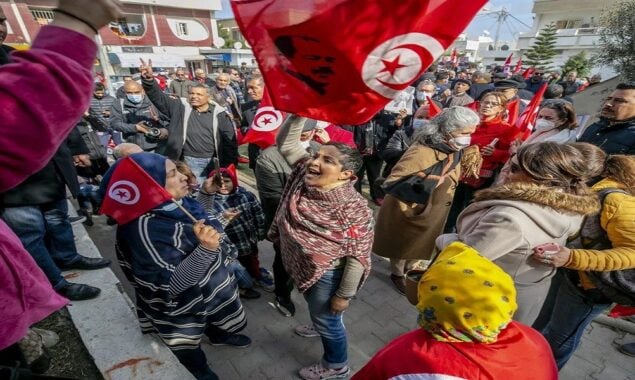
Tunisia’s Ennahdha warns against dropping Islam from constitution
- Ennahdha party warns against removing references to Islam from new constitution.
- New constitution is centrepiece of reform plans by President Kais Saied.
- Draft due to be put to the people on July 25th.
The Islamist-inspired Ennahdha party in Tunisia issued a warning on Monday against removing references to Islam from a new constitution that will be put to a referendum next month.
The new constitution is the centrepiece of reform plans by President Kais Saied, who last July sacked the government and suspended parliament, before later dissolving the legislature.
Ennahdha was parliament’s biggest party and a key player in the government dismissed in the president’s power grab.
Read more: Tunisia police block protests against Saied referendum
A legal expert charged with rewriting the 2014 constitution told AFP last week he would present Saied with a draft stripped of any reference to religion, in order to further weaken the influence of Islamist parties.
Sadeq Belaid said that would include erasing the first article, which says Tunisia is “a free, independent and sovereign state, Islam is its religion and Arabic is its language”.
“If you use religion to engage in political extremism, we will not allow that,” he said.
In a statement on Monday, Ennahdha warned “against attempts to attack the fundamental principles of the people, its Arab and Islamic identity and the civilian nature of the state”.
Ennahdha was the dominant force in Tunisian politics after the country’s 2011 revolution, which deposed longtime dictator Zine El Abidine Ben Ali and set in motion the Arab Spring.
The 2014 constitution was seen as a compromise between Ennahdha and its secular rivals.
The new draft, due to be put to the people on July 25 — the anniversary of Saied’s power grab — has yet to be published but is expected to boost the president’s powers vis-a-vis parliament.
Article one of the 2014 constitution also appeared in Tunisia’s first constitution in 1959, after its independence from France.
Read more: Tunisia, UK sign MoU on renewable energy
Ennahdha on Monday warned against “revisiting questions that were settled by the people since independence”.
It also deplored “cheap and dangerous attempts to instrumentalise these issues against dissenters”.
The party repeated its call for a boycott of the “so-called referendum”, saying the exercise aimed “to fake the public will in order to give artificial legitimacy to an oppressive system of one-man rule”.
Read More News On
Catch all the World News, Breaking News Event and Latest News Updates on The BOL News
Download The BOL News App to get the Daily News Update & Follow us on Google News.




